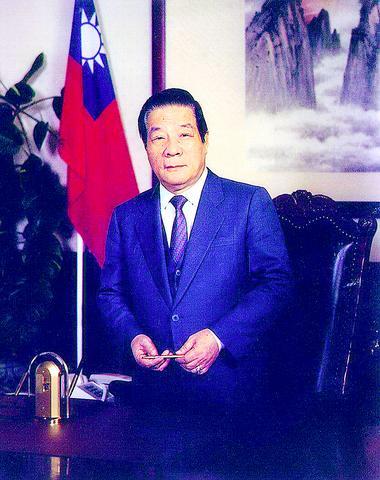Tsai Wan-lin (
Despite his family background, Tsai rose out of destitution to became one of the nation's legends -- one of those who have developed massive enterprises from scratch.

TAIPEI TIMES FILE PHOTO
At the age of eight, Tsai followed his elder brother, Tsai Wan-chun (
His business career started to take off after he established the Cathay Life Insurance Corp (
Cathay Life later become the flagship of Cathay Financial Holdings Co (國泰金控) and the group's main earnings contributor. At the end of June, Cathay Life accounted for 62 percent of Cathay Financial's consolidated assets of NT$2.5 trillion and 58 percent of the financial service company's capital of NT$146.7 billion, according to Taiwan Ratings Corp's (中華信評) statistics.
The family's financial group split in 1979 and in 1985, Tsai Wan-lin formed the Lin Yuan Group (
The group later evolved to include Symphox Information Co (
Earlier this year, Tsai and his family were estimated to hold assets worth US$4.6 billion, ranking 94th richest in the world, according to a Forbes report published in February. The nation's richest man had ranked 88th, 68th and 104th in the magazine's list in the previous three years.
Tsai Wan-lin moved to keep the business in the family. When he was 66, he began to make arrangements for his succession, putting his four sons in the business.
Currently, his second son, Tsai Hong-tu (
His third son, Tsai Cheng-yu (
Tsai's success in amassing a fortune out of nothing came from his bold yet precise investments in real estate. Cathay Life owns 230 buildings nationwide, with many located in prosperous downtown areas such as Taipei Main Station. These buildings contribute billions of NT dollars in rent every year, according to local media reports.
Tsai Wan-lin's younger brother, meanwhile, Tsai Wan-tsai (蔡萬才), is the fifth richest man in the nation, ranking 231 on the Forbes list this year, with US$2.3 billion in assets. Tsai Wan-tsai heads Fubon Financial Holding Co (富邦金控), the fifth-biggest financial services company with NT$1.26 trillion in assets last year.
Relations between the brothers had been strained for most of last 20 years, however, due to a financial scandal involving their nephew, Tsai Chern-chou (
In 1985, Tsai Chern-chou became embroiled in a controversy after embezzling over NT$7.8 billion from the 10th Credit Cooperative of Taipei (
On the business front, the brothers were rivals as well. The Cathay and Fubon groups have competed for dominance in the financial market.

STEEP DECLINE: Yesterday’s drop was the third-steepest in its history, the steepest being Monday’s drop in the wake of the tariff announcement on Wednesday last week Taiwanese stocks continued their heavy sell-off yesterday, as concerns over US tariffs and unwinding of leveraged bets weighed on the market. The benchmark TAIEX plunged 1,068.19 points, or 5.79 percent, to 17,391.76, notching the biggest drop among Asian peers as it hit a 15-month low. The decline came even after the government on late Tuesday authorized the NT$500 billion (US$15.2 billion) National Stabilization Fund (國安基金) to step in to buoy the market amid investors’ worries over tariffs imposed by US President Donald Trump. Yesterday’s decline was the third-steepest in its history, trailing only the declines of 2,065.87 points on Monday and

TAKING STOCK: A Taiwanese cookware firm in Vietnam urged customers to assess inventory or place orders early so shipments can reach the US while tariffs are paused Taiwanese businesses in Vietnam are exploring alternatives after the White House imposed a 46 percent import duty on Vietnamese goods, following US President Donald Trump’s announcement of “reciprocal” tariffs on the US’ trading partners. Lo Shih-liang (羅世良), chairman of Brico Industry Co (裕茂工業), a Taiwanese company that manufactures cast iron cookware and stove components in Vietnam, said that more than 40 percent of his business was tied to the US market, describing the constant US policy shifts as an emotional roller coaster. “I work during the day and stay up all night watching the news. I’ve been following US news until 3am

Six years ago, LVMH’s billionaire CEO Bernard Arnault and US President Donald Trump cut the blue ribbon on a factory in rural Texas that would make designer handbags for Louis Vuitton, one of the world’s best-known luxury brands. However, since the high-profile opening, the factory has faced a host of problems limiting production, 11 former Louis Vuitton employees said. The site has consistently ranked among the worst-performing for Louis Vuitton globally, “significantly” underperforming other facilities, said three former Louis Vuitton workers and a senior industry source, who cited internal rankings shared with staff. The plant’s problems — which have not

TARIFF CONCERNS: The chipmaker cited global uncertainty from US tariffs and a weakening economic outlook, but said its Singapore expansion remains on track Vanguard International Semiconductor Corp (世界先進), a foundry service provider specializing in producing power management and display driver chips, yesterday withdrew its full-year revenue projection of moderate growth for this year, as escalating US tariff tensions raised uncertainty and concern about a potential economic recession. The Hsinchu-based chipmaker in February said revenues this year would grow mildly from last year based on improving supply chain inventory levels and market demand. At the time, it also anticipated gradual quarter revenue growth. However, the US’ sweeping tariff policy has upended the industry’s supply chains and weakened economic prospects for the world economy, it said. “Now